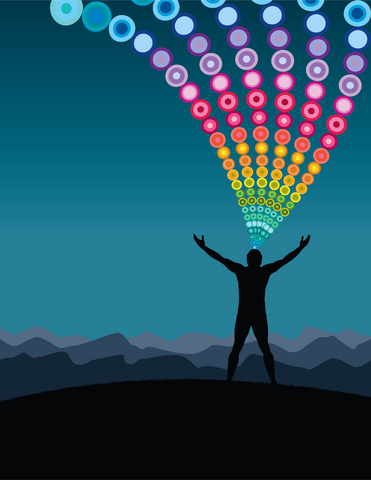Distraction Isn’t Your Enemy!
Considering that the main objective of meditation is to arrive at a state of non-distraction without altering our mind, how do we deal with the fact that distraction seems to be the one thing that prevents us from meditating? Is there some easy way to deal with our tendency to get distracted? After all, we’d probably all be excellent at meditation if it weren’t for the fact that we get so distracted during our meditation. And, it’s this distraction that can become the most frustrating and cause us to abandon our meditation practice in favor of something easier…like life’s many distractions!
Distraction Is an Invitation…to Return to Your Meditation!
What I find to be the key to any practice, meditation or otherwise, is to use the times that we’re not excelling at our practice as invitations to learn how to improve. For instance, how do you work with obstacles to anything that you’re trying to improve in such as parenting, eating better, exercising, studying, etc? If you’re trying to stay on a diet, how likely are you to succeed if you start eating fatty snacks just because you’ve done so in the past. Or, if you’re working on becoming more fit, will you ever run that 10k if you stop after the first run thinking that you’re “just not a runner?”
In the same way, when you sit down to meditate, it’s the very distractions that occur that can help you to realize how distracted you are and how much you need to learn to meditate. So, instead of seeing distractions as an adversary, can you see them as your allies, reminding you to turn your attention back to your practice?
Ten Handy Tips…
Here are ten handy tips on how not to give in to distraction while meditating. Feel free to add to this list, it’s only a start.
- When you find yourself to be distracted, see the very distraction as an invitation to return to your meditation practice.
- Be spacious with your mind. When you find that you’ve become distracted, have a sense of “spacious humor,” chuckle a little at your tendency to become distracted, and then return to your practice.
- Don’t take the distraction seriously. I mean, seriously, like you’ve never been distracted before? Just notice it, and then return to your practice.
- When you become distracted, see it as you would a wave rising in the ocean; momentary in its appearance, and then – without following it – allowing it to fall back into the mind from which it arose.
- Just observe whatever comes to your mind. So, for instance, if a thought distracted you, just look at that one thought, without creating any more thoughts around it. Does it stay, or is it replaced by another thought? And then, just let it go and return to your practice.
- Recognize your distraction as a habit, that’s all. And then, return to your practice.
- Feel grateful that at least you’re noticing how distracted you can be, and then return to your practice.
- When you find yourself distracted, connect with the observer who noticed your distraction. I can’t overemphasize the importance of this point. The fact that you are able to notice that you’re distracted tells you that there’s some part of you that is not distracted that is aware.
- If you find yourself just too distracted to meditate, just drop whatever method you’re using, and allow yourself to simply be.
- Return to tip # 1, and start again!
Don’t Allow Distraction to Distract You
Really, our biggest hindrance to meditation is our habit of becoming distracted and then allowing that distraction to prevent us from meditating. Especially when we’re beginning to learn to meditate, if we can overcome our tendency to procrastinate due to our daily distractions of watching television, tuning out and wasting time, we’ll find at least 10, 15 or even 20 minutes a day when we could be meditating.
Here’s a downloadable PDF of the list above for your personal use when you’re meditating, or when you’re at the office, studying, or working on a project. Enjoy!
For more information on how to meditate and how to deal with distractions, please see the Related Posts below. Also, don’t forget to download the free ebook, Can Meditation Change the Way that You View Your World?, for help with getting started in you meditation practice. Also, you can download the ebook, How to Work with the Four Distractions to Meditation to learn how to deal with some of the obstacles to meditation.
ALSO! This site has a new page, Media, where you can find articles, MP3 tracks for downloading, and videos on the subject of meditation.
As always, please feel free to share your comments. And, as always, please feel free to contact me if you’d like to see additional content or other discussions on this site.



What a wonderful way of looking at distractions! As reminders, as a sign that we are aware! Never thought of looking at them so positively. I have the tendency to beat myself up about them when they are too numerous, and we all know that is nothing but a hindrance to progress. Thanks, Jerome!
Nice write-up. With time all distractions vanish. Dont give up, welcome everything and flow towards the Supreme.
Indeed! Thanks so much for your comment. Isn’t it wonderful when we begin to get this, that the distractions aren’t as important as we once believed them to be. Take care and best wishes in your contemplative practices. Jerome
I loved the article Jerome and I’m interested to know how much it applies to physical distractions. Sometimes I meditate outside and a bug might land on me and start crawling around or I might start to get too hot. Should I embrace these distractions as invitations to strengthen my focus, or should I shoo the bug away and take a layer of clothing off to cool down so that I can meditate more deeply?
Hi Daniel – Great question, thanks for commenting. What I’ve found, and what I’ve learned from those who have gained a lot of experience in working with their mind and with distractions, is that physical sensations, while apparently more “real” than thoughts, are just as easy to work with as thoughts. To answer the last part first, why wouldn’t shooing a bug or taking a layer of clothing off be okay? After all, if you can do something about the distractions, it seems reasonable to do so. However, and this was a hard one for me, if you’re meditating outside and bugs are everywhere, constantly landing on you, and if they’re disturbing your meditation, then what are you going to do? Go inside? Yah, that’s one solution. But, if you feel that you can strengthen your focus through working with the critters, then give it a go! For me, the “magic” of working with distractions is that, indeed, they do strengthen my focus when I recognize that they’re impermanent and don’t get caught up in them. When I allow my mind to settle in a state of nondistraction, and relax into present moment-to-moment awareness, then the distractions…aren’t distractions. Like clouds in the sky, thoughts come and go without my getting caught up in their temporary appearance. Does this make sense? I hope that I’ve been able to articulate the answer well enough. Drop me a note and let me know what you think about this. Take care, Jerome